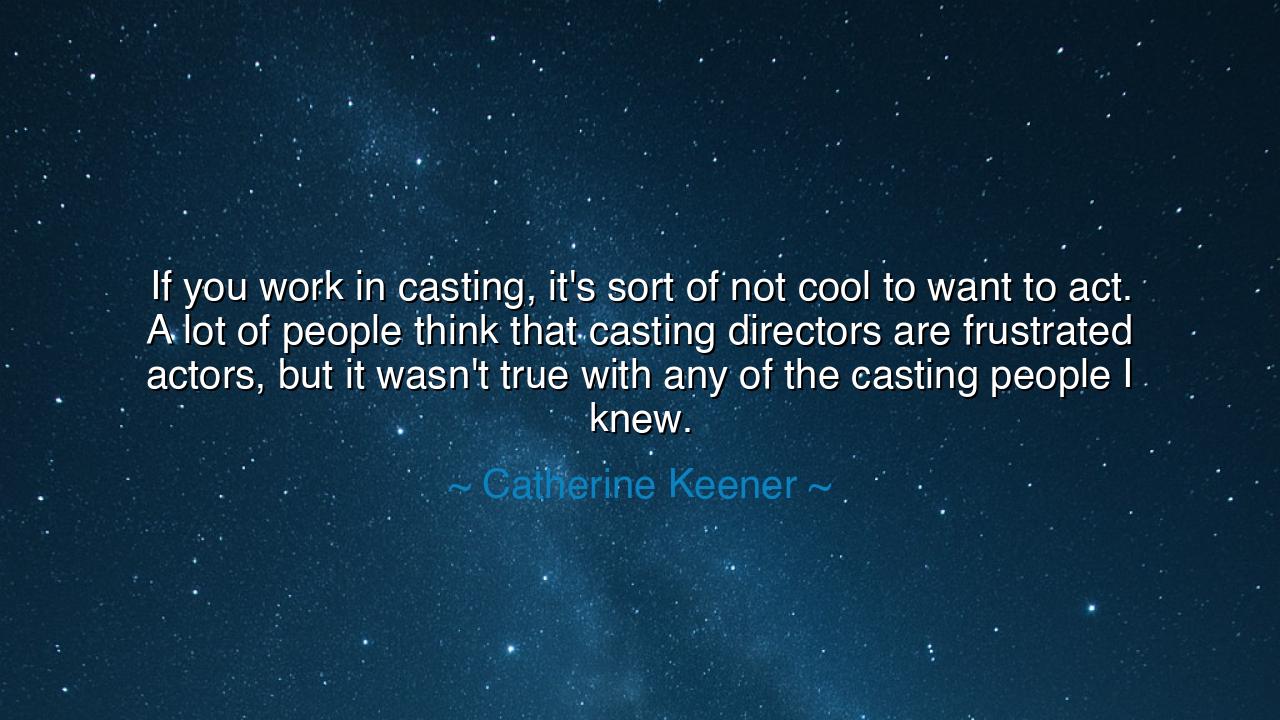
If you work in casting, it's sort of not cool to want to act. A
If you work in casting, it's sort of not cool to want to act. A lot of people think that casting directors are frustrated actors, but it wasn't true with any of the casting people I knew.






In the ever-complex dance of life, each of us is called to find our own path, one that resonates with our true nature. Yet, in the world of art, there often arises the temptation to chase status or to live the dream of another's role. Catherine Keener, in her thoughtful reflection, speaks to this tension when she says, "If you work in casting, it's sort of not cool to want to act. A lot of people think that casting directors are frustrated actors, but it wasn't true with any of the casting people I knew." Her words reveal the truth about authenticity and the role that individuality plays in finding fulfillment—not by stepping into the shoes of another, but by embracing one's own path with integrity and dedication.
The ancients too understood the importance of embracing one's true calling. In the world of Greek mythology, the gods often bestowed their gifts upon mortals, not by making them follow the dreams of others, but by helping them realize their own. Orpheus, the great poet and musician, was a man whose gift was not in acting out the roles of others but in expressing his unique talent through music. His songs were his legacy, not through mimicry, but through his own creativity. Similarly, Keener’s reflection on casting directors serves as a reminder that true fulfillment comes not from trying to fulfill someone else’s dream, but by following one’s own passion and purpose.
In the Roman Empire, the great thinkers and orators often emphasized the importance of self-awareness and personal integrity. Cicero, in his speeches, encouraged individuals to seek their own paths through life, to not be swayed by the whims of society or by the expectations of others. He believed that true greatness came from knowing oneself and embracing the role that only one’s true nature could fulfill. Just as Cicero advocated for authenticity, Keener too speaks to the value of embracing one’s position, recognizing that the role of a casting director is not a stepping stone to acting, but a valuable and meaningful pursuit in its own right.
The story of Leonardo da Vinci, the polymath who excelled not just in art but in engineering, anatomy, and science, also offers an insight into the wisdom of following one’s own path. Da Vinci was constantly questioned by his contemporaries for his ability to not only paint masterpieces but also delve into fields of knowledge that were outside the scope of traditional artists. Yet he never sought to conform to the traditional roles that others believed he should occupy. Instead, his life and work are a testament to the power of following one's own purpose, free from the constraints of societal expectations. In the same vein, Keener’s words suggest that true mastery in any field, whether it be casting or acting, comes from embracing one's calling fully, without the need to seek validation through others' roles.
Keener’s statement also touches on an important truth about judgment and expectation in the modern world. She acknowledges the common belief that casting directors are frustrated actors, revealing how society often assumes that one’s passion for a particular craft must follow a predetermined trajectory. The danger in this assumption is that it overlooks the diversity of potential and purpose that each individual holds. The casting director, as Keener suggests, may not be frustrated at all but may instead be deeply fulfilled in their unique role. Their work in bringing together the right actors, in creating the right moments on screen, is as vital to the success of a production as any performance. The lesson here is that value is not always found in outward appearances or traditional paths. Instead, it can often be found in the quiet dedication to one's own role, however unconventional it may seem.
The wisdom passed down by the ancients, and echoed in Keener's words, teaches us to resist the urge to compare our journeys to those of others. The path to fulfillment is not one-size-fits-all. Each individual has a unique role to play, and it is only by embracing that role with dedication and authenticity that we can achieve our true potential. Keener reminds us that there is no shame in walking a path that might not align with conventional expectations. Whether one is an actor, a casting director, or a scholar, the pursuit of one's true purpose, without the need for external validation, is the key to peace and success.
As we look at our own lives, let us ask ourselves: Are we trying to step into someone else’s shoes, to live according to the expectations placed upon us? Or are we willing to embrace our own path, to follow the call of our own passion and purpose? Let us remember the wisdom of the ancients and the insight of Keener—true fulfillment comes not from seeking to fulfill others' dreams, but from fully embracing the role that is uniquely ours. Only then will we find meaning and peace in the work that we do, and in the journey that we walk.






AAdministratorAdministrator
Welcome, honored guests. Please leave a comment, we will respond soon